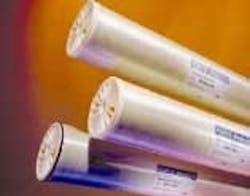Dow-Membrane Treatment System: New Membrane Treatment System Helps Meet Tougher Standards
With shrinking sources of fresh water and tighter drinking water regulations around the world, it is necessary for water treatment companies to look for new technologies that will address current and future drinking water needs in municipalities. In response to the needs of these companies, the Dow Chemical Company has introduced a new line of nanofiltration membrane module products.
Its Filmtec NF membranes are a barrier separation media that allows desirable minerals important in human health, like calcium and magnesium, to pass through but rejects organic compounds including most viruses, bacteria, pesticides and herbicides.
Nanofiltration is positioned between reverse osmosis (RO) and ultrafiltration. While RO can remove the smallest of solute molecules, in the range of 0.0001 micron in diameter and smaller, nanofiltration removes molecules in the 0.001 micron range.
NF is essentially a lower-pressure version of reverse osmosis where the purity of product water is not as critical as pharmaceutical grade water, or the level of dissolved solids to be removed is less than what is typically encountered in brackish water or seawater. As such, nanofiltration is especially suited to treatment of well water or water from many surface supplies like rivers or lakes.
Nanofiltration is used where the high salt rejection of reverse osmosis is not necessary. Yet NF is still capable of removing hardness elements such as calcium or magnesium. Like RO, NF is also capable of removing bacteria and viruses as well as organic-related color without generating undesirable chlorinated hydrocarbons and trihalomethanes (THMs).
Dow has introduced three new membranes to its family that already includes the Filmtec NF200B membrane and the Filmtec FT-30 membrane. The Filmtec NF90-400, Filmtec NF270-400, and the Filmtec NF200-400 membranes are all high area, high productivity membrane modules.
The NF90-400 is designed to remove most salts, nitrates, iron, and low molecular weight organic compounds. Its highly active membrane surface area combined with low net driving pressure allows for the removal of these compounds at low operating pressures. The NF270-400 membrane is designed to remove TOC and THM precursors with a medium to high salt passage and medium hardness passage. It is ideal for surface water and ground water purification. The NF200-400 membrane is designed to remove a high percentage of TOC including pesticides and herbicides, while allowing medium salt and hardness passage.
Sometimes referred to as "membrane softening," nanofiltration is an attractive alternative to lime softening or sodium chloride zeolite softening technologies. And since NF operates on lower pressure than does RO, energy costs are lower than for a comparable RO treatment system. This, combined with its use to remove pesticides and other organic contaminants from surface and ground waters to help ensure the safety of public drinking water supplies, make nanofiltration membranes a valuable tool for water treatment companies as they confront new challenges providing safe and clean water.

